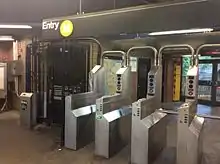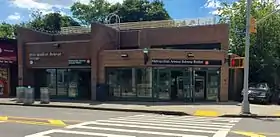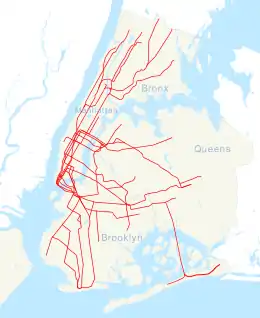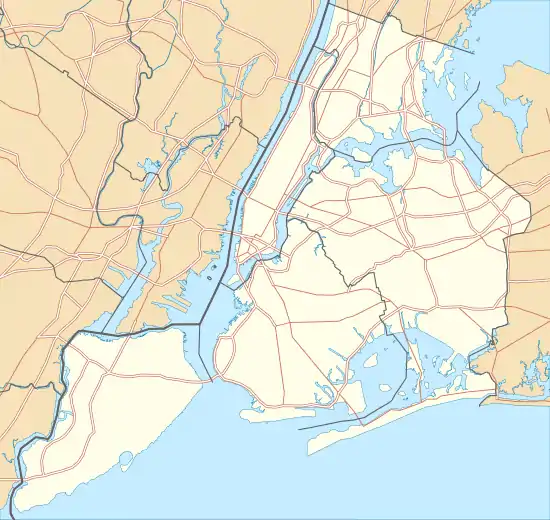Middle Village– Metropolitan Avenue | ||||||||||||||||||||||||||||||||||||||||||||||||||||||||||||||||||||||||||||||||||
|---|---|---|---|---|---|---|---|---|---|---|---|---|---|---|---|---|---|---|---|---|---|---|---|---|---|---|---|---|---|---|---|---|---|---|---|---|---|---|---|---|---|---|---|---|---|---|---|---|---|---|---|---|---|---|---|---|---|---|---|---|---|---|---|---|---|---|---|---|---|---|---|---|---|---|---|---|---|---|---|---|---|---|
 Platform view | ||||||||||||||||||||||||||||||||||||||||||||||||||||||||||||||||||||||||||||||||||
| Station statistics | ||||||||||||||||||||||||||||||||||||||||||||||||||||||||||||||||||||||||||||||||||
| Address | 67-28 Metropolitan Avenue Queens, NY 11379 | |||||||||||||||||||||||||||||||||||||||||||||||||||||||||||||||||||||||||||||||||
| Borough | Queens | |||||||||||||||||||||||||||||||||||||||||||||||||||||||||||||||||||||||||||||||||
| Locale | Middle Village | |||||||||||||||||||||||||||||||||||||||||||||||||||||||||||||||||||||||||||||||||
| Coordinates | 40°42′44″N 73°53′21″W / 40.712232°N 73.889194°W | |||||||||||||||||||||||||||||||||||||||||||||||||||||||||||||||||||||||||||||||||
| Division | B (BMT)[1] | |||||||||||||||||||||||||||||||||||||||||||||||||||||||||||||||||||||||||||||||||
| Line | BMT Myrtle Avenue Line | |||||||||||||||||||||||||||||||||||||||||||||||||||||||||||||||||||||||||||||||||
| Services | M | |||||||||||||||||||||||||||||||||||||||||||||||||||||||||||||||||||||||||||||||||
| Transit | ||||||||||||||||||||||||||||||||||||||||||||||||||||||||||||||||||||||||||||||||||
| Structure | At-grade at northern end; western side sloped into an embankment at southern end | |||||||||||||||||||||||||||||||||||||||||||||||||||||||||||||||||||||||||||||||||
| Platforms | 1 island platform | |||||||||||||||||||||||||||||||||||||||||||||||||||||||||||||||||||||||||||||||||
| Tracks | 2 | |||||||||||||||||||||||||||||||||||||||||||||||||||||||||||||||||||||||||||||||||
| Other information | ||||||||||||||||||||||||||||||||||||||||||||||||||||||||||||||||||||||||||||||||||
| Opened | October 1, 1906[2] | |||||||||||||||||||||||||||||||||||||||||||||||||||||||||||||||||||||||||||||||||
| Closed | July 16, 1974 (fire-related closure) July 1, 2017 (temporary line closure) | |||||||||||||||||||||||||||||||||||||||||||||||||||||||||||||||||||||||||||||||||
| Rebuilt | August 9, 1915 (relocation) 1980 (fire-related rebuilding) September 1, 2017 (temporary line closure) | |||||||||||||||||||||||||||||||||||||||||||||||||||||||||||||||||||||||||||||||||
| Accessible | ||||||||||||||||||||||||||||||||||||||||||||||||||||||||||||||||||||||||||||||||||
| Opposite- direction transfer | N/A | |||||||||||||||||||||||||||||||||||||||||||||||||||||||||||||||||||||||||||||||||
| Former/other names | Metropolitan Avenue | |||||||||||||||||||||||||||||||||||||||||||||||||||||||||||||||||||||||||||||||||
| Traffic | ||||||||||||||||||||||||||||||||||||||||||||||||||||||||||||||||||||||||||||||||||
| 2022 | 749,536[3] | |||||||||||||||||||||||||||||||||||||||||||||||||||||||||||||||||||||||||||||||||
| Rank | 335 out of 423[3] | |||||||||||||||||||||||||||||||||||||||||||||||||||||||||||||||||||||||||||||||||
| ||||||||||||||||||||||||||||||||||||||||||||||||||||||||||||||||||||||||||||||||||
| ||||||||||||||||||||||||||||||||||||||||||||||||||||||||||||||||||||||||||||||||||
| ||||||||||||||||||||||||||||||||||||||||||||||||||||||||||||||||||||||||||||||||||
| ||||||||||||||||||||||||||||||||||||||||||||||||||||||||||||||||||||||||||||||||||
| ||||||||||||||||||||||||||||||||||||||||||||||||||||||||||||||||||||||||||||||||||
The Middle Village–Metropolitan Avenue station is a terminal station of the BMT Myrtle Avenue Line of the New York City Subway. It is located at the intersection of Metropolitan Avenue and Rentar Plaza in Middle Village, Queens. The station is served by the M train at all times.
History

The station originally opened on October 1, 1906, to serve the adjacent Lutheran cemetery. It was part of an extension of the line past Wyckoff Avenue along a former steam dummy surface line.[2] A second station opened on August 9, 1915, west of the original facility,[2] while the other former surface stations were elevated. On July 16, 1974, a fire completely destroyed the original wooden platform and station house along with R27 cars 8202, 8203, 8237 and R30 car 8512 along with some fire damage done to R32 cars 3549, 3659, 3694 and 3695, and the station had to be completely rebuilt.[4] It reopened in 1980 with the current concrete platform and brick stationhouse.
By railroad and service directions, the station is the southern terminal of both the Myrtle Avenue Line and full-length M train. It was the northern terminal of the M train by service direction before its reroute on June 27, 2010.[5][6][7][8] Even though this is the M's southern terminal by railroad direction, the service's late-night terminus, Myrtle Avenue, is geographically further south, but the weekend and weekday terminals at Essex Street and Forest Hills–71st Avenue, respectively, are geographically further north.
Station layout
| Ground level | Exit/entrance | Fare control, station agent, MetroCard machines |
| Westbound | ← | |
| Island platform | ||
| Westbound | ← | |
The station, built on an embankment with the north end at street level,[2][4] has two tracks and a concrete island platform with benches. The tracks end at bumper blocks at the north end of the platform. A steel canopy with fluorescent lights and supported by silver columns covers the entire platform.
On the side of the westernmost track opposite from the platform is an employee-only facility. The control tower for the Myrtle Avenue Line is at the south end of the platform. Just to the south of the station lies the Fresh Pond Yard. It is only accessible from this station, so trains coming from Manhattan and Brooklyn must first enter the station, then reverse into the yard.
Exit

The grade-level station house, the station's only entrance, is located at the eastern corner of Rentar Plaza and Metropolitan Avenue.[9] It is made of bricks with glass windows.[10] There are two pairs of doors leading to the platform, turnstile bank and token booth. Also, there are two pairs of doors out to the street corner and another door along Metropolitan Avenue. Because the station house is at ground level and the platform extends out of the station house, this station is fully ADA-accessible, without an elevator or ramp.[11]
Points of interest
The New York Connecting Railroad travels in an open-cut, directly east of and parallel to the station.[10] To the station's east is Christ the King Regional High School.[9] Directly to the west of the station is Metro Mall, a large shopping mall opened in the early 1970s with now relatively few stores.[12] The station is located at Metropolitan Avenue's intersection with Rentar Plaza, which is the access road to the mall's parking lots.[10][9][13] The Lutheran All Faiths Cemetery is located on the northern and eastern sides of the station.[10][9][13]
References
- ↑ "Glossary". Second Avenue Subway Supplemental Draft Environmental Impact Statement (SDEIS) (PDF). Vol. 1. Metropolitan Transportation Authority. March 4, 2003. pp. 1–2. Archived from the original (PDF) on February 26, 2021. Retrieved January 1, 2021.
- 1 2 3 4 "New L Train Service to Lutheran Cemetery: B.R.T. Opens a Line To-morrow That Takes Passengers Into Queens County". Brooklyn Daily Eagle. September 30, 1906. p. 33. Retrieved September 28, 2015 – via Newspapers.com.
- 1 2 "Annual Subway Ridership (2017–2022)". Metropolitan Transportation Authority. 2022. Retrieved November 8, 2023.
- 1 2 "12 Passengers Led to Safety After Fire On Train Platform" (PDF). The New York Times. July 17, 1974. Retrieved September 28, 2015.
- ↑ "Memorandum: Modifications to 2010 NYC Transit Service Reductions" (PDF). mta.info. MTA New York City Transit Authority. March 19, 2010. Retrieved August 23, 2015.
- ↑ Grynbaum, Michael M. (March 19, 2010). "Under a New Subway Plan, the V Stands for Vanished". The New York Times. Retrieved March 20, 2010.
- ↑ "2010 NYC Transit Service Reductions" (PDF). mta.info. Metropolitan Transportation Authority. January 27, 2010. Archived from the original (PDF) on November 25, 2010. Retrieved August 2, 2015.
- ↑ "Review of the G Line" (PDF). mta.info. Metropolitan Transportation Authority. July 10, 2013. Retrieved August 2, 2015.
- 1 2 3 4 "MTA Neighborhood Maps: Ridgewood" (PDF). Metropolitan Transportation Authority. 2015. Retrieved September 28, 2015.
- 1 2 3 4 Dave Frattini (May 27, 2014). The Underground Guide to New York City Subways. St. Martin's Press. pp. 213–. ISBN 978-1-4668-7249-3.
- ↑ "NYC Official Accessibility Guide" (PDF). nyc.gov. City of New York. 2008. Archived from the original (PDF) on August 7, 2015. Retrieved September 20, 2015.
- ↑ "TIMES NEWSWEEKLY/OUR NEIGHBORHOOD THE WAY IT WAS". July 9, 2003. Archived from the original on July 9, 2003. Retrieved December 29, 2022.
- 1 2 "SUBWAY-SIDEWALK INTERFACE PROJECT TECHNICAL MEMORANDUM IV ISSUES AND OPPORTUNITIES" (PDF). transalt.org. New York City Department of City Planning. November 2000. Retrieved December 6, 2015.
External links
- nycsubway.org – BMT Myrtle Avenue Line: Metropolitan Avenue
- Station Reporter — M train
- The Subway Nut — Middle Village–Metropolitan Avenue Pictures
- Metropolitan Avenue entrance from Google Maps Street View
- Platform from Google Maps Street View


